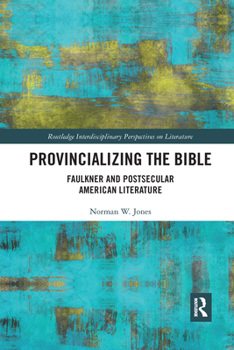Provincializing the Bible: Faulkner and Postsecular American Literature
Why, in our supposedly secular age, does the Bible feature prominently in so many influential and innovative works of contemporary U.S. literature? More pointedly, why would a book indelibly allied with a long history of institutionalized oppressions play a supporting role--and not simply as an object of critique--in a wide variety of landmark literary representations of marginalized subjectivities? The answers to these questions go beyond mere...
Format:Paperback
Language:English
ISBN:0367667169
ISBN13:9780367667160
Release Date:September 2020
Publisher:Routledge
Length:170 Pages
Customer Reviews
0 rating





